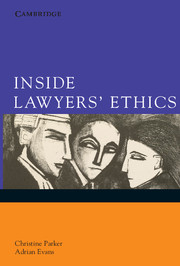Book contents
- Frontmatter
- Contents
- Preface
- Acknowledgments
- List of tables
- List of figures
- List of illustrations
- List of case studies
- Table of statutes
- Table of cases
- 1 Introduction: Values in Practice
- 2 Alternatives to Adversarial Advocacy
- 3 The Responsibility Climate: Regulation of Lawyers' Ethics
- 4 Civil Litigation and Excessive Adversarialism
- 5 Ethics in Criminal Justice: Proof and Truth
- 6 Ethics in Negotiation and Alternative Dispute Resolution
- 7 Conflicting Loyalties
- 8 Lawyers' Fees and Costs: Billing and Over-Charging
- 9 Corporate Lawyers and Corporate Misconduct
- 10 Conclusion – Personal Professionalism: Personal Values and Legal Professionalism
- Index
10 - Conclusion – Personal Professionalism: Personal Values and Legal Professionalism
- Frontmatter
- Contents
- Preface
- Acknowledgments
- List of tables
- List of figures
- List of illustrations
- List of case studies
- Table of statutes
- Table of cases
- 1 Introduction: Values in Practice
- 2 Alternatives to Adversarial Advocacy
- 3 The Responsibility Climate: Regulation of Lawyers' Ethics
- 4 Civil Litigation and Excessive Adversarialism
- 5 Ethics in Criminal Justice: Proof and Truth
- 6 Ethics in Negotiation and Alternative Dispute Resolution
- 7 Conflicting Loyalties
- 8 Lawyers' Fees and Costs: Billing and Over-Charging
- 9 Corporate Lawyers and Corporate Misconduct
- 10 Conclusion – Personal Professionalism: Personal Values and Legal Professionalism
- Index
Summary
Introduction
At the start of this book, four models for how we might decide what is ethical behaviour for lawyers were introduced. Zealous, client-focused lawyering, adversarial advocacy, was contrasted with lawyering that counterbalances client advocacy with upholding the responsibilities and duties of citizens to society, responsible lawyering. A third approach, moral activism, sees the ethical duties of lawyering not so much in vigorously asserting clients' rights, or the rule of law, as in actively doing one's best in the interests of justice. Finally, the ethics of care sees the ethical virtues of all three of the preceding approaches as overrated in comparison with the importance of caring for and respecting the needs and moral aspirations of each client, each witness, even each opponent with whom the lawyer may come in contact, as well as cultivating their own virtue as a person and a lawyer.
In practice, of course, lawyers can and do move around between these ideal types. The zealous adversarial advocate might still be dominant, but even the determined and fearless criminal barrister can and does change into the quiet and grieving carer, standing, if they are so permitted, near their condemned client when the trapdoor drops. Consider for example the case of Nguyen Tuong Van, aged 25, of Melbourne, who was hanged in Singapore on 2 December 2005 for smuggling 496 grams of heroin through Changi airport in 2002.
- Type
- Chapter
- Information
- Inside Lawyers' Ethics , pp. 243 - 258Publisher: Cambridge University PressPrint publication year: 2007



